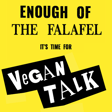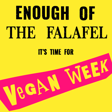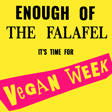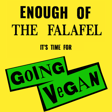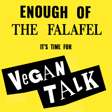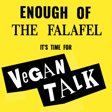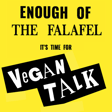Introduction to Vegan Children's Books
00:00:00
Speaker
Hello everybody. Well, did you know that as well as some people being vegan, some of them have children and they make those children be vegan and they make them read vegan children's books. Can you imagine such a thing? Well, we're going to talk to you about one such book today. It is coming out this week and Mark and Paul are going to talk about it with me in this episode of Vegan Talk.
00:00:28
Speaker
So I think vegans go looking for trouble even when they're not looking for trouble. That's not what butter's used for. Protein. Take your lab-grown meat elsewhere. We're not doing that in the state of Florida.
00:00:40
Speaker
What about your protein and what about your iron levels? Should I call the media and say, hi, sorry? They're arguing like, oh, poor woe is me. Hang on a minute. You always pick the...
00:00:56
Speaker
social injustice has connection another. That's just what people think vegans eat anyway. As long as you didn't get the wee brunions with the horns you'll be alright. Does veganism give him superpowers?
00:01:11
Speaker
I cannot fly around the city. I don't have laser vision. and Hi everyone, you are
Focus on 'Free Bird' by Christine Mott
00:01:16
Speaker
listening to Mark. Welcome to this episode of Vegan Talk. Thank you for being here. Hi all, this is Paul. Yeah, welcome to Vegan Talk. This is different to our normal vegan week where we go through about 10 or so items of news.
00:01:28
Speaker
This time we're going to delve into one particular topic and explore it more deeply. We've got numerous episodes of Vegan Talk available. And if you look in your podcasts, you'll see that we have, think, hundreds of these now, probably, well, over 100 at least anyway, available for your delectation.
00:01:47
Speaker
Indeed, your delectation. And for your delectation today, we are talking about a new book that is being released in this week that we are releasing the episode too. So it's very timely. It is a short book aimed at children called Free Bird. The author is Christine Mott and we need to mention the illustrator too because the illustrations are a big part of this too. The illustrator is Ofra Leia Isla.
00:02:13
Speaker
We'll give you a general synopsis straight away. Like i say, it's a short book so it'd be quite difficult for us to review it and talk about it without giving the plot away. It is based on a true story. Our central character is Flacco the Owl.
00:02:31
Speaker
And if you live in New York, we know lots of our listeners do listen to us stateside. um You might know Flacco the Owl's story, but basically Flacco the Owl lived, if you can call it living,
00:02:44
Speaker
in ah jail, an animal jail, otherwise known as a zoo. But they escaped. The zoo pursued them and tried to recapture them, but was unsuccessful.
00:02:55
Speaker
And yeah, Flacco the owl lived their life out wild and free in New York
Impact of 'Free Bird' and Book's Sales Proceeds
00:03:01
Speaker
City. So this book has been released documenting that. It's obviously framed in child-friendly language, although I would say that there are some relatively, wouldn't say complex things, but you know, we're we're talking about being imprisoned and being free and hopes and dreams and things like that.
00:03:18
Speaker
So it's not completely basic. Interestingly, a good portion, so half of the proceeds from the book will be donated to the Wild Bird Fund, which is a non-profit that rehabilitates sick, injured and orphaned wildlife and releases them back to the wilds of New York City.
00:03:39
Speaker
So we're going to start off by hearing what each of each of us thought of the book, and then we might talk about some general themes and small c, have some critique and some discussion ah about it as we do with all of our review shows.
00:03:56
Speaker
Paul, are you happy to get the ball rolling? what What was your thought on the book? We've had this advanced copy, very lucky we are to have it too. What did you think Yeah, it was really nice to get that. um You know, I think it's ah nice for our podcast as we're kind of growing now to attract people's interest in wanting to share these things with us in the kind of so fairly exclusive nature. So, yeah, really nice to get that. Yeah, it felt like it feels like a very well marketed book. I like the way that it represents animals in this sort of legal setting. It's pretty impressive.
Themes and Critiques of Zoos
00:04:31
Speaker
I mean, it it is aimed, I think, at four to eight-year-olds, but I think some of the language and some of the some of the topics are probably, might be quite challenging for people of those age, but it's it's yeah it's it's good.
00:04:45
Speaker
Obviously, it's very American-focused, very sort of New York City, somewhere I've never actually been. Loved the illustrations, loved the kind of um particularly...
00:04:58
Speaker
drawings showing animals dreaming of being in their natural habitat that felt very poignant to me of course some of these animals here would have never known their natural habitat because they'd have probably been born into captivity but um you know obviously the the point is there to try try and emphasize i guess to younger readers that you know this isn't a natural habitat for for people um for people for animals and start to raise the more complex questions around zoos and and and similar organisations and their claims of conservation and education with animals versus um maybe a vegan view that it's exploitation for profit.
00:05:40
Speaker
So, you know, getting into quite a complex kind of discussion, but it does open the door on that kind of questioning that hopefully kids can challenge their parents and and and adults on as to why do we need zoos? Why should we go to zoos? Why should we enjoy zoos, for example?
00:05:55
Speaker
So yeah, really, really good on that front. um Love the wanted posters that kind of gave that impression that the animals had done something wrong and they were like an escaped prisoner again, when the real criminals are really the captors and the jailers of the animals.
00:06:11
Speaker
And I like to see the situation we had with the with the horses who were there as police horses who were sort of fervent. free but um also being exploited in in ah in a slightly different way to what animals in zoos were. So yeah, i mean, that was my initial view. um I've got other stuff, but perhaps I'll let you come in with your view before I kind of run off to too much with it. Yeah, yeah, absolutely. Thank you. I i will.
00:06:36
Speaker
I really enjoyed it. and that there's There's obviously many different ways that that children and families and adults can enjoy and interpret books. And I would say that this would be one that you would read alongside a child. I think that because there's there's wider issues there to discuss, isn't there? And actually, we could, Flacco is anthropomorphised in that Flacco is speaking English to other animals and they're communicating with one earth one another and They visit a museum and and and and things like that. So in a sense, that there's nothing wrong with stories that do that for animals. But I would say because there is such a strong animal rights message here, I kind of... want that to be interpreted almost by an adult i i would say i'm i'm not saying that that that's the only way it should should be digested this material but i think to to bring out the best in it and the beautiful illustrations that are there too like i think ah the ah a beautiful thing about children's books is that very often you could have a huge double page
00:07:48
Speaker
with just one sentence on it, but then there's so much scope for discussion and in a really beautiful, detailed picture, which there is in this book. So reading it and sharing it with a child or a child sharing it with an adult, I think would be great. It's it's a really lovely story that that works on many levels because we've we've given the the synopsis there. It's basically, Al lives in zoo, escapes, zoo tries to get Al back,
00:08:16
Speaker
but Al carries on living in New York. That's basically it. But that like like, say, Paul, there's there's talks about hopes there. There's talks about, you know, what does it mean to be
Animal Perceptions in Urban vs. Rural Settings
00:08:26
Speaker
free and things like that.
00:08:28
Speaker
Also, like I thought for for folk who live in a city, people will, in urban environments, have interactions with animals, but it's not the same as seeing them in what we might call their natural habitat in in the wild, in nature, in in the countryside. So it's an interesting reflection on that.
00:08:49
Speaker
Because i I don't know, I'm just thinking of where where we live. You've got like pigeons on the street and seagulls, and generally they're just seen as a nuisance. and And that's it. I wouldn't say many people look at a ah seagull and marvel at its majesty, you know, or or or rat.
00:09:04
Speaker
and things like that so it's it's a nice insight into a different way of of viewing animals that live in cities and also similarly for folk that live in the countryside actually seeing though it is anthropomorphized seeing well there are actually animals that live in cities too and that that looks different how do we feel about that and things like that So I think there's an awful lot of scope for but really interesting, revealing discussions.
00:09:32
Speaker
I think it's just brilliant how it's been put together and and like you say, the the marketing pool and and the fact that some of the big chunk of the proceeds are going towards...
00:09:43
Speaker
good causes i mean the the author christine mott they're an attorney and an animal advocate 15 years of experience leading legal and policy efforts to protect animals i mean talk about having lots of strings to your bow yeah i i mean to say it to start with actually because i i looked at this isn't her first book and not her first sort of project and she's ah You look at her to personal achievements. um Yeah, it's a string of stuff here. So it was kind of um interesting to see. This is someone who's fought for animals in in in settings that probably you or I would would really...
00:10:19
Speaker
it just do not know where to start with you know kind of using the law and stuff so great that someone can kind of jump from something so technical and and difficult to I'm not saying this isn't difficult to write kid stories I couldn't do it but something at the other end of the spectrum you know great great to have that range of engagement with animal rights across the board there know absolutely fantastic Right, Mark, me and Paul have been gabbering
Children's Books and Moral Messages
00:10:44
Speaker
along. We've not let you get a word in edgeways here. Tell us what your impressions were of this book.
00:10:50
Speaker
So as a father of two young kids, and they're they're probably a little bit old for reading this book. They're seven and ten, although the seven-year-old would still get something from it. I've read... countless kids books from from the very new and modern and sort of up sort of up-to-date sort of ones to archaic things that are hand-me-downs from generations past when outlooks and things were very different indeed and everything in in in between really and most of these books try to have a message sometimes the message is very garbled sometimes it's very ah different to the sort of message that that and I would give.
00:11:27
Speaker
Some of them are very abstract and I don't know what they're trying to say at all. And it's just about pretty pictures and sort of bizarre settings. So children's books are very important. but when you When you compare them to how animals were presented in days of old, things have come a long way. And you do realize when you're reading some of these old books to kids that the morality in the story is very, very antagonistic to the sort of thinking I have.
00:11:54
Speaker
And they do reinforce cultural norms and consensus values that when they were written were probably typically ah very normal. But times have changed. And ah kids' books are sort of a metric of that change to an extent because almost everything that we input into kids is designed to push them along, to increase their intelligence, to make them more emotionally intelligent and all of that.
00:12:21
Speaker
there There are many things that that that are just there simply for fun's sake. There's usually a point or at least a pretentive point around the whole thing. So whilst the message in the book is quite straightforward to to the likes of us, I think it's quite groundbreaking in certain ways. and A trip to the zoo is typically...
00:12:41
Speaker
a thing that parents would bring kids along to a sea. I know it's quite a big thing. In the town I'm living in now in New Plymouth, and there is a zoo here and it's free to go into for everyone.
00:12:53
Speaker
It's quite a well-off parish because of the dairy industry and fossil fuel extraction. So the council have a lot of money and and the way they they sort of throw that money around is by putting on lots of festivals here and a free zoo.
00:13:08
Speaker
haven't been to it. I haven't thought about it until now, actually, but it is something that the kids are going to ask me to go and to bring them along and see. I haven't been to zoo in so long. I shudder to think what it's going to be like if if I do ever go there. um So this story concerns the an owl freeing itself from a zoo. So it's not like it's an abattoir or somewhere where people would would consider a dark place to be for ah for an animal. It isn't from a factory farm. It's from a zoo. It's from something that a lot of people wouldn't wouldn't have a problem with. And it's sort of... it'ss
00:13:43
Speaker
humanising the owl, it's giving the animal a personality and agency. And these things are very good to, this is a good education for for kids to have, that an animal isn't going to like, isn't going to want to be cooped up, is going to try and free him or herself.
00:14:00
Speaker
and And this is a success story around that. So i think it's a positive story to tell to kids. As I say, it's quite straightforward, as most kids' books are, or should be but the the morality is pretty spot on i would say I don't really have a problem with the message. I think it's good to get that message into kids' minds at an early age. It's it's a good counterpoint to the other messages is that that they're they're going to be getting concerning animals at that age as well.
00:14:27
Speaker
As they come to understand the world, it's good for them to understand that animals want to be free, just the same as human animals will want to be free. So I think it's well ah it's well illustrated, it's well intended, and it's it's what it's one more book to add to the canon of pro-animal rights literature out there. It's quite hard to write a kid's book that makes sense to a kid when you're an adult because you want to stuff in detail, and kids are light on detail.
00:14:53
Speaker
It's just a broad stroke sort of thing. So I think they hit that point right. So yeah, I think it's it's it's a positive
Introducing Radical Ideas through Children's Literature
00:15:00
Speaker
step. It's good book. Yeah, yeah. You you mentioned in in terms of you know similarities between human hopes and human desires and wishes and an animal's ones there and it did make me think i i wonder whether you could give this book or lend it to somebody without mentioning the animal rights message and just say that this is really nice book it's it's talking about you know hopes and and things like that you know but because a lot of the language early on is talking about aspirations and things like that. I wonder whether you could sort of smuggle it into somebody's book collection without them realizing, oh no, it's a vegan book. What are you doing? You're polluting my child's mind.
00:15:45
Speaker
You know, and it's it's called Free Bird flacco that owl's dreams take flight you know that's i mean that's a universal message that even a carnist could get on board with yeah indeed um in fact uh children's books and comics for the older child are are very good mediums for getting across quite otherwise radical messages to a receptive audience i know it worked to me when when when i was reading 2000 a.d and comics like that when I was seven, eight, nine, ten.
00:16:14
Speaker
And it made a big impression on me because it really did put animals, non-human animals to the fore in so many other stories and gave them agency and made them the lead in these ongoing series of stories like nit like Nemesis the Warlock and Flesh and Strontium Dog. they they They cherished and celebrated difference in their in their stories. it might sound trivial and it's easy to read these comics as throwaway, blast them type stories. And actually they aren't. There was an awful lot of thought put into them. And it's one area where the sensor isn't looking lot of the times because people assume that they arere just throwaway items
00:16:52
Speaker
In fact, comics used to be used as ballast in ships coming over from the States to the UK. and And then they were literally thrown away almost. And they were just given to shopkeepers would sell them for a penny each.
00:17:04
Speaker
And they were ballast, but there were stories on them and kids loved them. And then they took off into an industry in and of itself, a huge industry. And you have the likes of Alan Moore and Grant Robinson and people like that putting forward very radical messages.
00:17:17
Speaker
So this is a similar idea, but at ah um a much younger audience again. So I think it's quite a clever, productive way of introducing radical ideas. to some people yeah up the revolution up the revolution i'm i'm interested paul if i can ask you this initially at what point did you realize that this was based on a true story had had you read a blurb that sort of gave it away before you were reading it or did it come across through the reading of it uh the first point was when you told me it was because i didn't pick it up before so it was uh yeah i mean i i um i
00:17:51
Speaker
didn't realize it was and it now I know it is it kind of probably helps explain certain things because some of the more critique items I'd noted downwards that I thought that perhaps the things like the the escape could be a little bit more dramatic you know kind of like perhaps kids would be more like oh it's bit like a chicken run type thing like where I suppose it's like oh there's a hole in the there was a hole in the fence or whatever it was i was like oh okay well that's That's cool. um But I was like, oh, maybe you could jazz it up a a little bit. but
00:18:22
Speaker
So yeah, that was and something. But yeah, as I say, I mean, I think anything like this tapping into kids and compassion is, you know, 10 out of 10. So it's fantastic. I don't know whether like four to eight year old me would have really enjoyed it. I think I think i would have done.
00:18:36
Speaker
um because But probably, think again, the um the the pictorial stuff would have really got me, I think, because that that would have definitely dragged me in. So i'm really glad they... um I think, like I said before, it's it's one to to engage with a child and an adult accompanying one another and and and sitting next to one another, because it's so much of, I guess, how we've evolved as a species, are as as a dominant species. Like I work with young children and before it possibly could have been taught to them, they do seem to have an intrinsic desire to control nature.
00:19:12
Speaker
And to, quote, help animals, but they're actually destroying their homes or whatever. Oh, I'm helping this worm. No, you're not. It was fine. Leave it alone. You know, um and I think even if you've got a child who's been brought up in a vegan household and and and everything like that, I still think...
00:19:30
Speaker
at this age, you want an element of interpretation going on. So I i think that's the way to win enjoy this. sorry Sorry to repeat myself, but I think that's the way to do it. But that kind of how attaches to the the concept of, is it worth mentioning that this is a true story at the outset?
00:19:46
Speaker
I guess you could just do a scientific study, couldn't you? find some Find some vegan twins. Maybe you could do it, Mark, with your your two children. Tell one of them it's a earth and true story and the other, don't let them know. See if there's a difference.
00:19:57
Speaker
Yeah, yeah, yeah, ah right did there is There has been a tendency for some people to think, to put forward the idea that humans are innately, they innately want to kill and eat animals and that kids, if they're left to their own without any input, will naturally tend towards that attitude.
00:20:17
Speaker
And when you have kids, you sort of realise how untrue that is and how how much kids are fascinated and love nature.
Children's Natural Fascination with Animals
00:20:25
Speaker
and ah and and particularly animals because where they move around that they find them endless sources of fascination and the sources of fun animals seem to gravitate towards kids as well it couldn't be further from the truth to say or to think that we are innately hostile towards these animals and if you were to put say a four-year-old boy in a room with an apple and a rabbit. What's the boy going to eat? He's going to eat the apple and stroke the rabbit, probably. If if he's if he's if he's not really badly adjusted, that is, if he's not a psychopath, that is what he would probably do, not tear the rabbit apart and drink its blood from from from it from its neck or anything. you know So it it's all around you how fascinated and interested and how much love
00:21:09
Speaker
kids have four animals. And somewhere along the line, that gets hijacked and destroyed and manipulated into its opposite. Where and how exactly that happens will vary from culture to culture, age to age.
00:21:21
Speaker
But kids aren't born with a desire to go out killing animals at all. In fact, it's the opposite. I mean, it it it struck me when you when you were talking, Mark, earlier about...
00:21:32
Speaker
the The tide of opposition there is to books like this, that the the countless number of children's picture books where there is ah an animal centric farm with happy animals, one of each animal.
00:21:47
Speaker
There's only ever one pig and one cow and they all live together and they're all friends and they're all happy to be there. and and none of them ever die that's put in and there's there's reams of that and there's songs that are catchy that get in your head with flashing pictures on youtube and everything like that really the the job that the the publishers and the author and the illustrator have done here in many ways just getting it done regardless of of the messaging in there that's the main thing because it's just a counterpoint to all of that isn't it and and credit to them
00:22:22
Speaker
and and credit to anyone else doing things like this, because it just is one of those things where you just need someone to say, yeah, it doesn't have to be like that. You know, here is a book that says something a bit different. um I mean, i did do either of you remember the story Dear Zoo?
00:22:38
Speaker
And it's it's a it's a ah it' a classic. It's still in print, I think. It's a classic book, sort of three, four-year-olds. It's aimed at, and it's it's somebody basically writing to the zoo saying, can you send me...
00:22:51
Speaker
This animal, I really want a really fun animal to to play with, to have as a pet. That's how i remember it anyway. But that's like a cornerstone. If you were to say, like name the top five most evocative books for for British children age four to five or whatever, Dear Zoo would be up there.
00:23:08
Speaker
And like it's completely normalizing a zoo. And here we have a story, we're here we have a book that's saying, no, zoos aren't good places. Sentient thinking beings that can form relationships, that have hopes, that want to be free, they don't like those places.
00:23:25
Speaker
They're bad places.
Realism vs. Idealism in 'Free Bird'
00:23:26
Speaker
Great, job done. Job done, you know? The only other thing going say is I ah struggled a little bit with the the the jump from the story to the kind of human follow your dreams, everything can happen if you follow your dreams type thing.
00:23:39
Speaker
That sort of thing, because I'm a half glass empty kind of cynical old bastard. ah found that as words formula yeah I found that a little bit cliched to some extent. And that's just that's just me. It's just the kind of person I am that I'm kind of more like, why don't you tell people they're going to work in an office rather than kind of be a pop star type thing.
00:24:02
Speaker
yeah Anyway, i'm going down I'm going down a very weird rabbit hole here, but you know what mean? It's kind like... ah And then Flacco the adult took up their dream of working a desk job.
00:24:13
Speaker
Yeah, he went to be insurance, really.
00:24:17
Speaker
I would i would ah love to read a book that you wrote for a kid's pool. Someday. yeah ah Yeah. One day, if you're lucky, you'll grow up and you'll have a pension. End of story.
00:24:29
Speaker
yeah and Make sure it's a vegan pension. Yeah. Yeah, well, oh don' don't get me started. Yeah, yeah, yeah. So, yeah. Yeah. Yeah, well, well good good for the whole team that is ah that has put this together. And, um you know, thank you for sharing it with us ahead of release dates. You can follow the link in our show notes to to find out how to buy it um And like we said at the top, half of the proceeds go towards an animal centric charity that's rehoming, looking after birds. So really sort of central to the theme of the book here. The author is Christine Mott.
00:25:06
Speaker
The illustrator is Ofra Laya Eiler. um And the publisher is Lantern Publishing and Media. If you have come across this kind of work before or you've got other children's books that you think it would be interesting for us to review we can have a whole series of these too wouldn't it be good to have a little library that we can recommend people we would love to hear from you here is how to get in touch with us To get in touch with us, just send us an email at enoughofthefalafel at gmail.com.
00:25:40
Speaker
We see ourselves as a collective. Our listenership stretches all around the world and everyone's opinions, questions, feedback and ideas are what helps shape the show.
00:25:52
Speaker
Go on, send us a message today. enough of the falafel at gmail dot com Thank you, Mark. And thank you, Paul, for joining me on that ah exclusive pre-release ah review of the book, ah Free Bird, the story of Flacco the Owl. And like we say, half of the proceeds going to an animal-based charity there. So kudos for them.
00:26:17
Speaker
Just a little reminder to listeners, um if this is your first time or your hundredth time listening to us, if you've not left us a review or you've not recommended our show to anybody, we'd love it if you could do that because we don't have a marketing budget or people who can publish and publicize our shows for us.
00:26:33
Speaker
We rely on you doing that for us. So every one of you that can do that, we're very, very grateful for, and we're just grateful for you listening too. So you've kind of already done your bit. Right, enough of my waffle. Mark, what have you got to tell us?
00:26:45
Speaker
The next episode of Enough of the Falafel will be coming out Monday, 5th of May, and it will be st starring Carlos, Dominic and Julie. It will be a Vegan Week episode, which is the usual weekly roundup of the latest vegan and animal rights news.
00:27:00
Speaker
Anyway, that's enough of the falafel for this episode. Thanks to Mark and Anthony for all your contributions. Thanks again, everyone, for listening. I've been Paul, and you've been listening to Vegan Talk from the Enough of the Falafel Collective.
00:27:20
Speaker
This has been an Enough of the Falafel production. We're just a normal bunch of everyday vegans putting our voices out there. The show is hosted by Zencaster. We use music and special effects by zapsplap.com.
00:27:35
Speaker
And sometimes, if you're lucky, at the end of an episode, you'll hear a poem by Mr Dominic Berry. Thanks all for listening and see you next time.
00:28:01
Speaker
This episode may have come to an end, but did you know we've got a whole archive containing all our shows dating back to September 2023? That is right, Dominic. There's over 100 episodes on there featuring our brilliant range of different guests, people's stories of going vegan, philosophical debates, moral quandaries, and of course...
00:28:22
Speaker
around a dozen news items from around the world each week so check back on your podcast player to hear previous episodes and remember to get an alert for each new episode simply click like or follow and also subscribe to the show thanks for your ongoing support wherever you listen to us from

